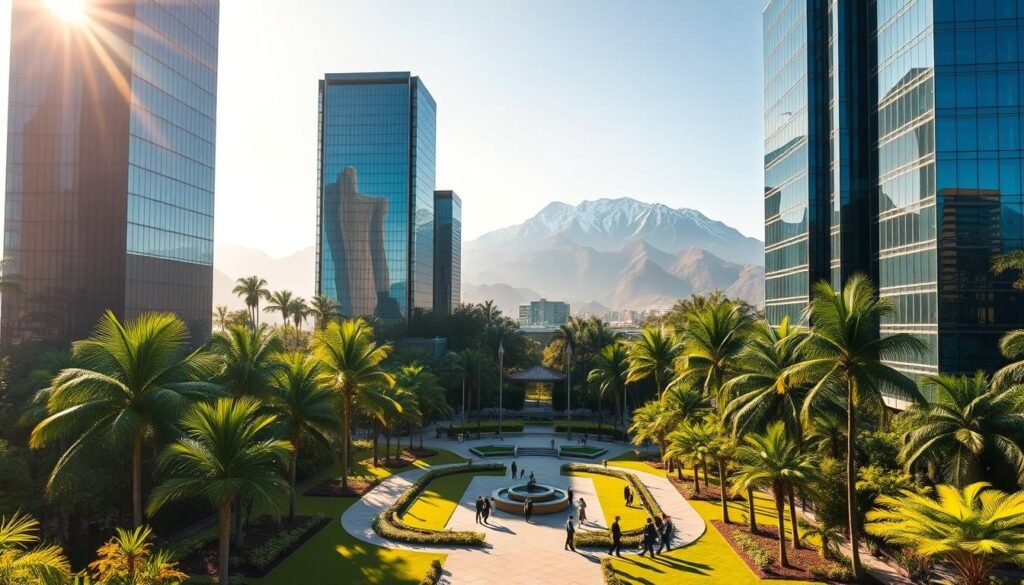How do senior leaders manage their time while juggling demanding roles and personal commitments abroad? This question is more relevant than ever in today’s fast-paced global business environment.
Many executives face long working hours, often extending into weekends and vacations. This can lead to increased stress and strain on personal relationships. Yet, the evolving attitudes toward accountability and well-being are reshaping how leaders approach their life balance.
This article explores actionable strategies to blend professional aspirations with personal well-being. We’ll share insights from seasoned professionals across various sectors, offering practical solutions to help you thrive in your role while maintaining a fulfilling personal life.
Key Takeaways
- Senior leaders often work longer hours, impacting their personal time.
- Cultural adaptation programs can significantly improve well-being.
- Flexible working arrangements are key to maintaining balance.
- Family support plays a crucial role in reducing stress.
- Intentional strategies can help manage high-pressure roles effectively.
Understanding the Executive Landscape in Colombia
Navigating the executive landscape in Colombia requires a deep understanding of its unique cultural and business dynamics. The country’s rich traditions and evolving practices shape how leaders operate in this vibrant market. For expats, adapting to this environment is both a challenge and an opportunity.

Context and Cultural Nuances
Colombia’s business culture is deeply rooted in its social norms and traditions. Relationship-building is a cornerstone of professional interactions. Executives often find that trust and personal connections are as important as formal agreements.
Understanding local etiquette is crucial. For example, punctuality is valued, but meetings may start late as a sign of flexibility. This blend of formality and adaptability reflects the country’s approach to management and teamwork.
Adapting to a New Professional Environment
Transitioning into Colombia’s professional setting can be rewarding but requires preparation. Expats often face challenges in understanding regional work practices. However, those who invest time in learning the culture and building relationships tend to succeed.
Teamwork is highly emphasized in Colombian companies. Leaders who foster collaboration and respect local traditions are more likely to gain the trust of their teams. This approach not only enhances business outcomes but also supports personal well-being.
| Aspect | Colombia | Global Average |
|---|---|---|
| Time Spent on Relationships | High | Moderate |
| Flexibility in Meetings | Common | Rare |
| Team Collaboration | Highly Valued | Moderately Valued |
In summary, Colombia’s executive landscape offers a unique blend of tradition and modernity. By embracing local culture and fostering strong relationships, expats can thrive in this dynamic environment.
Work-Life Balance for Expats in Executive Roles: Challenges and Realities
The challenges of high-level roles extend beyond the boardroom, impacting every aspect of life. Senior leaders often juggle immense responsibilities, long hours, and personal commitments. This balancing act becomes even more complex when navigating a new cultural and professional environment.

The Demands of High-Level Responsibility
Executives face constant pressure to deliver results. Their roles often require strategic decision-making, managing teams, and meeting tight deadlines. These responsibilities can lead to extended working hours, even during weekends and vacations.
According to recent studies, 88% of organizations encouraged or required employees to work from home during the pandemic. This blurred the lines between professional and personal time, adding to the stress of leadership roles.
Impact of Long Working Hours and Business Culture
Long hours are a hallmark of executive life. Many leaders report working 60 or more hours per week. This demanding schedule can lead to burnout and strain personal relationships.
Research shows that higher work stress correlates with lower job involvement. Executives must find ways to manage their time effectively to maintain productivity and well-being.
The Role of Family and Personal Commitments
Family support is crucial for executives, especially those working abroad. Partner dissatisfaction is a primary reason for expatriate performance failure. Balancing family needs with professional demands is a constant challenge. To ensure a successful expatriate experience, organizations must prioritize family adaptation and well-being. This includes providing resources to help partners integrate into the new environment and fostering open communication about family needs. Additionally, considering expat salary negotiation strategies that account for family support can significantly enhance the overall experience and productivity of the executive abroad.
During the pandemic, many leaders found increased family interaction beneficial. However, the pressure to meet both personal and professional expectations remains significant.
Effective Strategies and Time Management for Executive Success
Achieving success in leadership roles demands more than just professional skills. It requires a thoughtful approach to managing time and energy. By adopting practical strategies, executives can thrive in their roles while maintaining personal well-being.

Prioritizing Health and Wellbeing
Health is the foundation of sustained performance. Executives must prioritize physical and mental well-being to handle the pressure of their roles. Regular exercise, adequate sleep, and mindfulness practices can make a significant difference.
Studies show that leaders who invest in their health are more productive and resilient. Scheduling personal time for self-care is not a luxury but a necessity for long-term success.
Setting Boundaries and Delegating Tasks
Clear boundaries are essential to protect personal time. Executives should define their working hours and stick to them. This helps prevent burnout and ensures quality time with family and friends.
Delegating tasks is another critical strategy. By empowering their team, leaders can focus on high-priority goals. This not only reduces workload but also fosters a collaborative and supportive culture.
Small adjustments, like scheduling breaks and setting realistic deadlines, can contribute significantly to achieving a better life balance. Open communication with the team about responsibilities ensures everyone is aligned and supported.
Innovative Approaches to Leadership and Cultural Change
Leadership roles are evolving, and innovative approaches are reshaping how we think about success. Traditional models of overburdened schedules and rigid structures are being replaced by strategies that prioritize well-being and flexibility. These changes are not just beneficial for individuals but also for the overall health of organizations.

Redefining Work Norms in Senior Roles
Senior roles no longer have to mean endless hours and constant stress. By redefining work norms, leaders can create attractive positions that balance responsibility with personal time. This shift encourages a healthier approach to leadership, where success is measured by impact rather than hours logged.
For example, Vodafone Egypt’s cultural transformation showed how promoting open communication and merit-based systems can lead to higher engagement and productivity. Leaders who embrace these changes often see improved team dynamics and better results.
Exploring Flexible Work Models and Job Sharing
Flexible work models are gaining traction as a way to support life balance. Job sharing, for instance, allows two leaders to split responsibilities, ensuring continuous coverage without overburdening one person. This approach not only reduces stress but also brings diverse perspectives to the role.
Studies show that such models can enhance productivity and job satisfaction. By adopting these practices, companies can attract a broader range of talent, including those who might otherwise avoid senior positions due to demanding schedules.
Fostering an Open Culture of Support and Recognition
An open, supportive culture is essential for sustainable leadership. When leaders model healthy boundaries and prioritize well-being, it sets a positive example for the entire team. Recognition of efforts and achievements further strengthens this environment.
Creating such a culture requires intentional effort. Regular check-ins, transparent communication, and opportunities for feedback can make a significant difference. These practices not only improve morale but also drive long-term success.
Closing Insights on Balancing Aspirations and Wellbeing
Balancing professional aspirations with personal well-being is a critical challenge for leaders. Throughout this article, we’ve explored actionable strategies to achieve a harmonious life balance. By prioritizing time management and self-care, leaders can sustain long-term success.
Setting boundaries and taking restorative breaks are essential. Studies show that leaders who model healthy habits inspire their teams and enhance productivity. Small, intentional changes can make a significant difference in achieving a fulfilling balance.
Reimagining leadership norms fosters better decision-making and well-being. By embracing flexibility and open communication, leaders can create a supportive environment. Let’s start this journey toward a more balanced and rewarding professional life.
